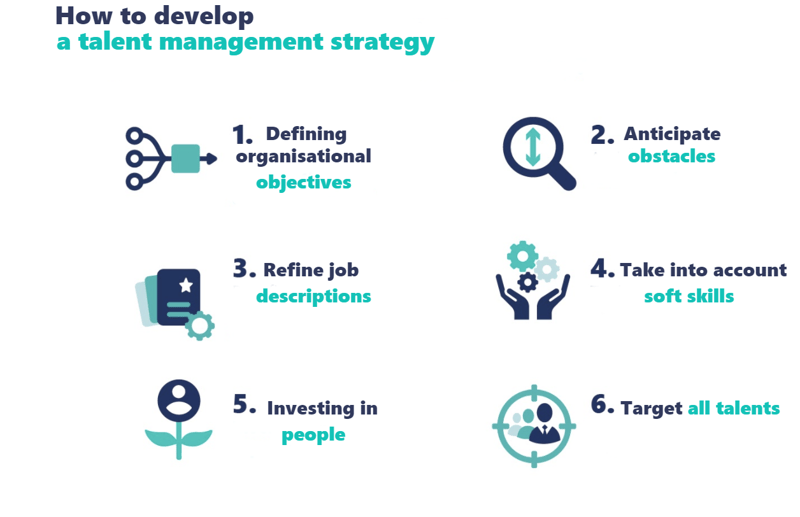Talent management refers to the recruitment of the best candidates, but also to employees’ retention on the long-term basis. Developing an effective talent management strategy requires attention to detail. The shortage of talent in the labor market in recent times has made human capital a tremendous asset to an organization.
The objective of each recruitment process is to find candidates with the right skills and soft skills to fill the position. You can be sure that once recruited, they will achieve excellent results. They will inspire their colleagues to do the same and the whole team will progress together. Too simple to be true? You can find this rare gem by developing an effective management strategy. Follow these tips to find your perfect match!

1. Define organizational goals
You must first determine your company's goals clearly and precisely to design a talent strategy that works.
These goals will help you assess both applicants and employees. This will give you a better idea of what matters to your company. Ultimately, you will know where your company is headed. This initiative will help you gain your management's support for your talent management strategy. After all, you're building a team capable of achieving the company's goals, both in the short and long term. What CEO wouldn't like that?
How do you define your goals ?
You already know that the foundation of a good talent management starts with defining your goals. What goals are we talking about?
As a human resources manager, you naturally must consider the human aspect. Simply put, you need to think of your goals as a measure of human capital.
Start by determining how many employees it takes to get a specific job done on time. You'll then know whether or not you need to hire new people. If you do, you will also know how much new talent you will need to recruit. In this case, you need to work closely with the managers of each department, because only they know what is missing in their team. This shows that all staff contribute in some way to talent management.
2. Anticipate obstacles
Once you've defined your organizational goals, finding the talent that fully meets your criteria can be a real challenge. There are more and more recruitment platforms, however good talents are becoming scarce. At this stage, your mission is to identify all the potential obstacles that may prevent you from finding the right candidate as accurately as possible. You may even want to change your salary structure:
- This might involve revising benefits to appeal to a specific age group.
- Maybe you need to expand your search outside your geographic area if the local talent pool is limited (particularly with telecommuting).
These are a few examples of the obstacles that could block a recruitment process, but there are others depending on the industry or position to fill. In any case, it's best to anticipate problems, so you can find the best solutions long before they arise. Your talent management strategy will be more robust because you'll know how to address negative elements that could compromise it.
3. Improve job descriptions
Job descriptions go beyond recruitment. Of course, well-written, powerful job offers always attract more candidates that fit the company's culture. However, managers can also use job descriptions to assess their team's performance and identify areas that require professional development. They can even highlight development opportunities.
However, job descriptions are often written by recruiters who don't have in-depth knowledge of the position. It's a good idea to ask managers to write job descriptions with you. This is another example of how developing a good talent management strategy is truly a team effort.
4. Take into account Soft Skills
Job descriptions go beyond recruitment. Of course, well-written and powerful advertisements always attract more candidates that fit the company culture. But managers can also use job descriptions to assess the performance of their team and identify areas that require professional development. They can even highlight development opportunities.
However, job descriptions are often written by recruiters who do not have an in-depth knowledge of the jobs in question. It is a good idea to ask managers to write the job descriptions with you. This again shows that developing a good talent management strategy is a team effort.
5. Consider soft skills
It's very easy to fall for an attractive resume! But if you only consider degrees, technical skills and experience, you risk recruiting a talent that doesn't fit your corporate culture. It's important to remember that many profiles can have the same qualifications and everyone is capable of developing their know-how with the appropriate training, for example. On the other hand, personality cannot be taught, nor can good manners!
Don't get us wrong, technical skills or hard skills are still significant for a job well done. However, candidates with soft skills adapted to the company culture will bring added value to the team. They will integrate more easily into the company. They are also more likely to become major players in the development of your company. Furthermore, they are less likely to quit in the months or even years to come. Ultimately, this is what talent management is all about: knowing how to retain and build loyalty over time.
What are the soft skills you need?
It all depends on your corporate culture, but generally speaking, some human qualities are beneficial to all companies. Here are some examples:
- Adaptability
- Autonomy and initiative
- Team spirit
- Empathy
- Emotional intelligence
- Interpersonal skills
- Creativity
- Critical thinking
- Discipline
- Organizational skills
- Resistance to pressure
6. Invest in people - focus on internal staff mobility
Given the talent shortage, we recommend not limiting your search to new profiles. Instead, consider each employee as a long-term investment. Don't go straight to LinkedIn and job boards every time a position becomes available within your company. It can also be a good idea to recruit internally to save time and money at the same time.
You won't have to write a powerful job offer or post it on all the niche platforms. You won't have to sort through resumes, conduct interviews and many other tasks related to a normal recruitment process. Studies have shown that external candidates expect a salary 18 to 20% higher than an employee who is already on board. Even if you have to invest in training, this option is still more advantageous, because you already have a talent perfectly adapted to your company culture.
6. Target all talent
A good recruitment strategy allows you to attract the most promising external candidates and to retain or enhance internal talent at the same time. It helps managers put the right people together to get the job done. It's important to optimize your process in order to attract the best talents, without neglecting those who are already part of the company. You need to retain them by creating a pleasant work environment and implementing a good team building strategy. This will also improve your employer brand, which will have a very positive impact on recruitment.
CONCLUSION
A great talent management strategy helps you find the best candidates. This requires that you clearly define your recruiting objectives while taking into account your company's human resources needs. How much new talent do you require? You should ask the concerned managers for their opinion throughout the recruitment process. They can also help you write the job description. Once the objectives are well-defined, you need to anticipate the obstacles that could delay or block a recruitment. When screening candidates, don't only check the applicant's qualifications, technical skills and experience, but also consider their soft skills. You should also look at your internal resources before posting a job offer.
You can outsource your recruitment to optimize your talent management strategy. Hunteed allows you to collaborate with the best agencies in the industry. You will benefit from high quality expertise. Our experts will put in the time and effort to find the right candidates. You can then focus on other HR tasks. As you've seen in this article, you also need to value your employees, because it's not just about managing new talent, but also about managing the people who are already running your business. When you outsource your recruiting to Hunteed, you'll have more time to focus on employee retention, among other things.















 ENGexpand_more
ENGexpand_more  FR
FR